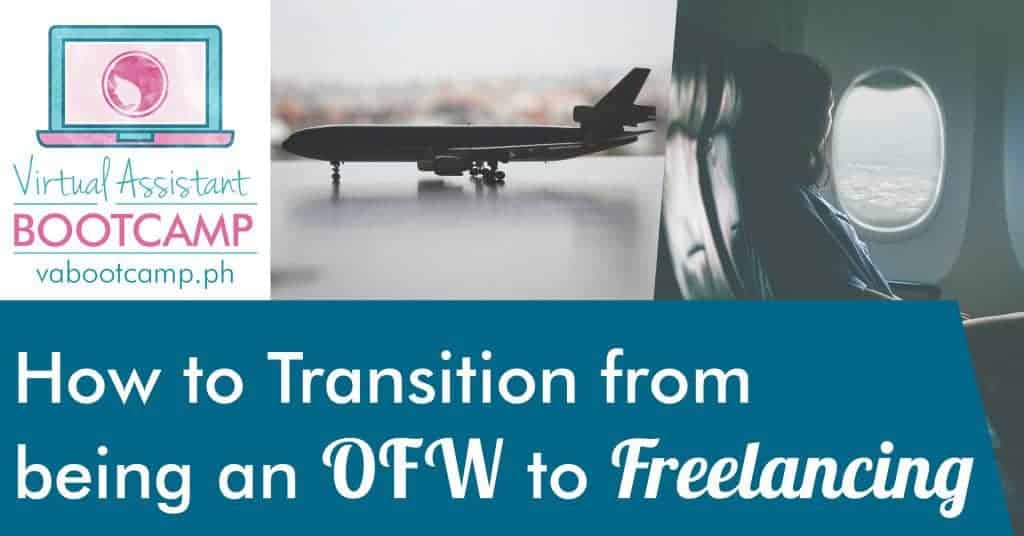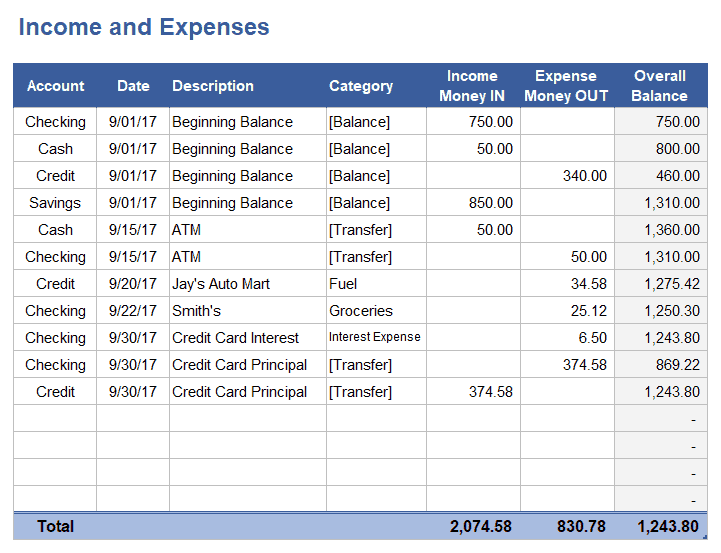Menu

Do you wish you can go back home for good? Trust me, I know the feeling.
The feeling of longing for your loved ones especially this holiday season. The feeling that you want to be there with your kids as they grow up. The feeling of missing your spouse & wishing you can guide your kids together.
Ironically, your family, the reason why you want to go back home is the same reason why you left the country in the first place. You’re willing to bear the pain of homesickness just so you can provide a comfortable life for them.
But is working abroad the only way?
Thanks to the internet because now there's another way to earn dollars without having to work abroad and this is through online freelancing.
If it’s your first time to hear about freelancing, read The Ultimate Newbie Guide to Freelancing here.
We’ve seen a lot of Overseas Filipino Workers try freelancing but after a few months, they fail and give up. That's why I've written this guide for you Kabayan so you can fully transition from being an OFW to a full-time freelancer.
Here are the action steps you can take to get you closer to going back home for good:
Photo by rawpixel.com from Unsplash
If you’re serious about diving into freelancing, you’ve got to start building your emergency fund. This is an amount of cash equivalent to 6 months of your monthly expenses which you can use in the future in case things don’t work as planned.
As most OFWs are breadwinners, having an emergency fund will keep you from panicking in case you don’t get hired during the first few months of going back to the Philippines knowing that you can pay the bills and support your family using the cash you've set aside.
When you're prepared financially, you’re giving yourself a few months to test and learn everything about the new career you’re pursuing without having to worry about *Junjun’s* tuition fee, or getting your house foreclosed, or turning your spouse into a nagger complaining every single day where to get money to buy food for your kids.
In short, your emergency fund is your “sanity protector.”
The amount of money you can save depends on your income, status, and lifestyle. A single OFW earning P100,000/mo and has no financial obligation at all can save much faster compared to a married OFW earning P100,000/mo who supports his 3 children and his retired parents.
So how can you build your emergency fund? Regardless of your income status, here's an effective step by step guide for you:
Here’s a simple Income and Expense Worksheet by Vertex42.com

You may use this by downloading the worksheet here.
You may also use some of these helpful tools for money management:

Although working from home is becoming popular in the Philippines, most Filipinos are not yet used to the idea of freelancing. So expect that your family may not understand your new career.
They may say things like "sayang naman pinagaralan mo sa bahay ka lang pala" or "may trabaho kaba talaga?"
That's why it pays to patiently inform and educate them as well. Share them the pros and cons of online freelancing and involve them in your process by sharing videos, news, and articles about working from home. They may be skeptical at first just like how we felt the first time we discovered freelancing but as long as you continue educating them, they will understand it over time.
Aside from your family, there's a possibility that you'll doubt yourself too. As a newbie, you might not yet know how to write effective cover letters, how to get clients and how to do the actual online work. A lot of times, you'll encounter rejections and when this happens you might feel that giving up is the only option.
Now the question is... how do you prepare yourself mentally and emotionally?
The answer is MINDSET. You've got to set your mind that every rejection you'll face and every mistake you’ll make are just part of the process. Practice being comfortable with the uncomfortable.
To help you become more confident about your skills, study how to become a freelancer the right way. Since you are working abroad, it is likely that your OFW friends and colleagues will have no idea what freelancing is. So surround yourself with experienced and newbie freelancers by joining Facebook groups like FreeLancers In the Philippines (FLIP). Chat with the members and build a relationship with them. You’ll be surprised to know that your online freelancer friends will be your support system when you don’t know what to do next.

Photo by Artem Bali from Pexels
This is very important. If you really wanna be successful in saving for your emergency fund, you might as well start living and maintaining a simple lifestyle.
Consider going through all the stuff you own. You might find valuable items that you no longer need. Why not sell them instead of letting them collect dust at home? If your items are in good condition, the buyer will save money for buying second-hand items and you’ll earn extra cash! WIN-WIN! Not to mention you'll have fewer items to clean which means less stress!
Once you part ways with your unwanted and unnecessary possessions, stop spending on things you don't need and only buy new things when replacing old ones. Before you purchase anything, ask yourself: “Do I really need this or do I just want this?”
Here's a "Should I Buy This?" guide by Smart About Money

Living a simple lifestyle is not limited to material stuff. This also includes breaking bad habits such as the palibre, pautang, and pakikisama mentalities.
Because you work abroad and you earn a different currency other than the Philippine peso, your friends and relatives in the Philippines usually think that you have more money than them. As a result, when you go home, you'll hear things like "pasalubong naman jan!", "libre naman jan!," or "pautang naman!"
For us OFWs, when we go home for our vacation leave, usually everything is on our tab.
Sometimes we end up using our savings or max out our credit cards to make sure that we gave everyone something because of fear of being labeled as "madamot"
Kabayan, let us not feel pressured by this "libre naman jan" mentality. We can say YES if you have the budget for it. Otherwise, we must learn how and when to say NO. After all, our true friends and relatives who really care for us will definitely understand.
Do you feel bad not to treat your friends and relatives?
Here's a script on how to say NO in a diplomatic way:
Conyo and kidding tone: "I'd love to libre you friends but my budget is planned for our family already. Sorry, I can't treat you guys now. Peace out ✌️! "
Polite and serious: "I'm sorry po pero naka-plano na yung funds namin at wala pa pong extra sa ngayon. Pasensya na po."
You can change your tone depending on who you're speaking to. You're messaging will be different when you're speaking to a friend asking for "libre" as compared to your aunt who borrows money from you. You shouldn't feel guilty for saying NO because you're saving for your future - something you've always wanted to do.

Photo by rawpixel.com from Pexels
As a newbie, you will have a learning curve because you'll be venturing on a whole new world. Some people can jump right in and are more willing to risk losing their income from employment. If you're the breadwinner of the family, you better test the waters first. Start freelancing on the side while you still have full-time employment abroad.
This requires a lot of sacrifice and discipline on your end because you still have a full-time job. While time-management is definitely gonna be a challenge for you, freelancing on the side can be your hidden and unfair advantage. The good thing about this is you are slowly transitioning. You have the security of your monthly income and you'll be earning extra cash through your new found side hustle. ?
On top of that, your salary is typically higher than the salary in our country which means you have the capacity to invest in paid courses that might help you gain the skills to speed up your journey to going back home for good.
Once you learn the basics, you can start looking for clients. The easiest way to get hired is by starting as a general virtual assistant. This way you’ll get to learn different skill sets and then you can specialize later on. Do freelance work during your days off or after your shift.
When you get your first client, give your best effort in making your first client happy. Learn how to solve your client’s problems and she/he will refer you to his/her friends who are business owners too. Keep in mind that you are aiming for a positive testimonial to slowly build your online portfolio. Collect case studies, certifications, badges, and awards. Do this consistently and you can go back home to the Philippines for good in no time.
Magandang magsimula po sa pag enroll dito sa FREE course na ito
freevacourse.com
I am also a breadwinner in the family and a solo parent to my 2 children. When I heard about freelancing, it really took my interest and start seaching about it. Hope you can help me with this. A million thanks!
Hi Mark! As a breadwinner myself, I can totally understand you. To help you with learning how to do freelancing, you can use the resources here in our website. To learn more, you may also register here for free: freevacourse.com.
Best of luck!